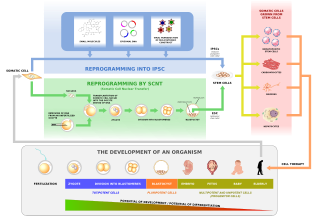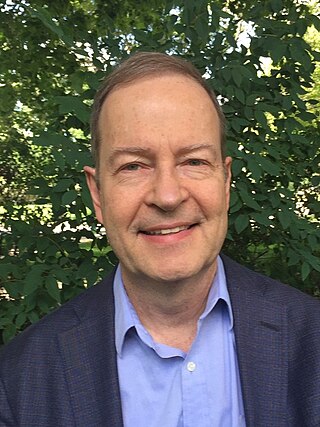
Eugenics is a set of beliefs and practices that aim to improve the genetic quality of a human population. Historically, eugenicists have altered various human gene frequencies by inhibiting the fertility of people and groups purported to be inferior or promoting that of those purported to be superior.

Human cloning is the creation of a genetically identical copy of a human. The term is generally used to refer to artificial human cloning, which is the reproduction of human cells and tissue. It does not refer to the natural conception and delivery of identical twins. The possibilities of human cloning have raised controversies. These ethical concerns have prompted several nations to pass laws regarding human cloning.
Bioethics is both a field of study and professional practice, interested in ethical issues related to health, including those emerging from advances in biology, medicine, and technologies. It proposes the discussion about moral discernment in society and it is often related to medical policy and practice, but also to broader questions as environment, well-being and public health. Bioethics is concerned with the ethical questions that arise in the relationships among life sciences, biotechnology, medicine, politics, law, theology and philosophy. It includes the study of values relating to primary care, other branches of medicine, ethical education in science, animal, and environmental ethics, and public health.

Arthur L. Caplan is an American ethicist and professor of bioethics at New York University Grossman School of Medicine.
New eugenics, also known as liberal eugenics, advocates enhancing human characteristics and capacities through the use of reproductive technology and human genetic engineering. Those who advocate new eugenics generally think selecting or altering embryos should be left to the preferences of parents, rather than forbidden. "New" eugenics purports to distinguish itself from the forms of eugenics practiced and advocated in the 20th century, which fell into disrepute after World War II.
Gregory Stock is an American biophysicist, best-selling author, biotech entrepreneur, and the former director of the Program on Medicine, Technology and Society at UCLA’s School of Medicine. His interests lie in the scientific and evolutionary as well as ethical, social and political implications of today's revolutions in the life sciences and in information technology and computers.

Julian Savulescu is an Australian philosopher and bioethicist. He is Chen Su Lan Centennial Professor in Medical Ethics and director of the Centre for Biomedical Ethics at National University of Singapore. He was previously Uehiro Chair in Practical Ethics at the University of Oxford, Fellow of St Cross College, Oxford, director of the Oxford Uehiro Centre for Practical Ethics, and co-director of the Wellcome Centre for Ethics and Humanities. He is visiting professorial fellow in Biomedical Ethics at the Murdoch Children's Research Institute in Australia, and distinguished visiting professor in law at Melbourne University since 2017. He directs the Biomedical Ethics Research Group and is a member of the Centre for Ethics of Pediatric Genomics in Australia. He is a former editor and current board member of the Journal of Medical Ethics, which is ranked as the No.2 journal in bioethics worldwide by Google Scholar Metrics, as of 2022. In addition to his background in applied ethics and philosophy, he also has a background in medicine and neuroscience and completed his MBBS (Hons) and BMedSc at Monash University, graduating top of his class with 18 of 19 final year prizes in Medicine. He edits the Oxford University Press book series, the Uehiro Series in Practical Ethics.
Andrew Shaw Goudie is a geographer at the University of Oxford specialising in desert geomorphology, dust storms, weathering, and climatic change in the tropics. He is also known for his teaching and best-selling textbooks on human impacts on the environment. He is the author, co-author, editor, or co-editor of forty-one books and more than two hundred papers published in learned journals. He combines research and some teaching with administrative roles.
Professor David Simon Oderberg is an Australian philosopher of metaphysics and ethics based in Britain since 1987. He is Professor of Philosophy at the University of Reading. He describes himself as a non-consequentialist or a traditionalist in his works. Broadly speaking, Oderberg places himself in opposition to Peter Singer and other utilitarian or consequentialist thinkers. He has published over thirty academic papers and has authored six books: The Metaphysics of Good and Evil, Opting Out: Conscience and Cooperation in a Pluralistic Society, Real Essentialism, Applied Ethics, Moral Theory, and The Metaphysics of Identity over Time. Professor Oderberg is an alumnus of the Universities of Melbourne, where he completed his first degrees, and Oxford where he gained his D.Phil.

Christoph Rehmann-Sutter is a philosopher and bioethicist. He is holding a professorship for theory and ethics in biosciences at the Institute for History of Medicine and Science Studies at the University of Lübeck in Germany.
Robert Klitzman is an American psychiatrist and bioethicist.

John Morley Harris, FMedSci, FRSA, FRSB, is a British bioethicist and philosopher. He is the Lord Alliance Professor of Bioethics and Director of the Institute for Science, Ethics and Innovation at the University of Manchester.
David DeGrazia is an American moral philosopher specializing in bioethics, animal ethics, and the study of moral status. He is Professor of Philosophy at George Washington University, where he has taught since 1989, and the author or editor of several books on ethics, including Taking Animals Seriously: Mental Life and Moral Status (1996), Human Identity and Bioethics (2005), and Creation Ethics: Reproduction, Genetics, and Quality of Life (2012).

Martin Hume Johnson is a British scientist who is emeritus professor of Reproductive Sciences in the Department of Physiology, Development and Neuroscience (PDN) at the University of Cambridge.

Françoise Elvina BaylisFISC is a Canadian bioethicist whose work is at the intersection of applied ethics, health policy, and practice. The focus of her research is on issues of women's health and assisted reproductive technologies, but her research and publication record also extend to such topics as research involving humans, gene editing, novel genetic technologies, public health, the role of bioethics consultants, and neuroethics. Baylis' interest in the impact of bioethics on health and public policy as well as her commitment to citizen engagement]and participatory democracy sees her engage with print, radio, television, and other online publications.
Jan Deckers works in bioethics at Newcastle University. His work revolves mainly around three topics: animal ethics, reproductive ethics and embryo research, and ethics of genetics.

S. Matthew Liao is a Taiwanese-American philosopher specializing in bioethics and normative ethics. Liao currently holds the Arthur Zitrin Chair of Bioethics, and is the Director of the Center for Bioethics and Affiliated Professor in the Department of Philosophy at New York University. He has previously held appointments at Oxford, Johns Hopkins, Georgetown, and Princeton.

John F. Kilner is a bioethicist who held the Franklin and Dorothy Forman endowed chair in ethics and theology at Trinity International University, where he was also Professor of Bioethics and Contemporary Culture and Director of Bioethics Degree Programs. He is a Senior Fellow at The Center for Bioethics & Human Dignity (CBHD) in Deerfield, Illinois, where he served as Founding Director until Fall 2005.

Vardit Ravitsky, an Israeli-Canadian, is a bioethicist, researcher, and author. She is president and CEO of The Hastings Center, a senior lecturer on Global Health and Social Medicine at Harvard Medical School, and past president of the International Association of Bioethics. She is a Fellow of the Pierre Elliott Trudeau Foundation, where she chaired the COVID-19 Impact Committee. She is also a Fellow of The Hastings Center and of the Canadian Academy of Health Sciences. Previously, she was a full professor at the University of Montreal, and director of Ethics and Health at the Center for Research on Ethics.
The Anscombe Bioethics Centre is a Catholic academic institute based in Oxford, which engages in scholarship, public debate, and education. Established in 1977, it is the oldest bioethical research institution in the United Kingdom.










